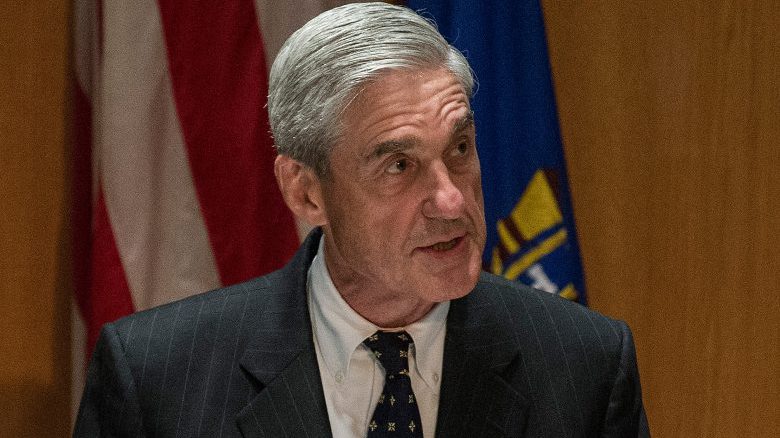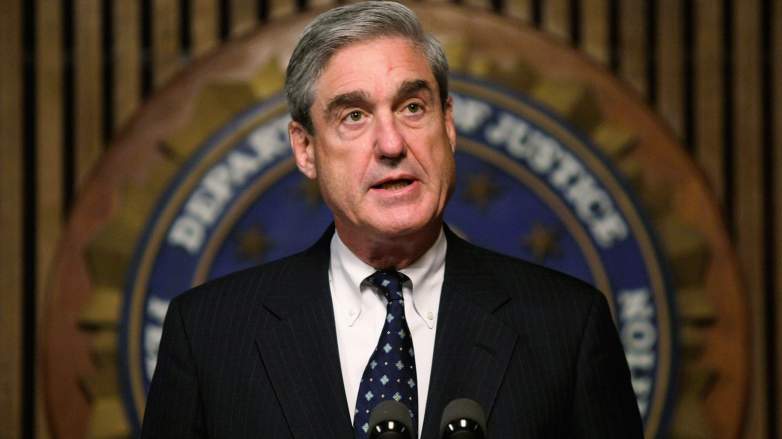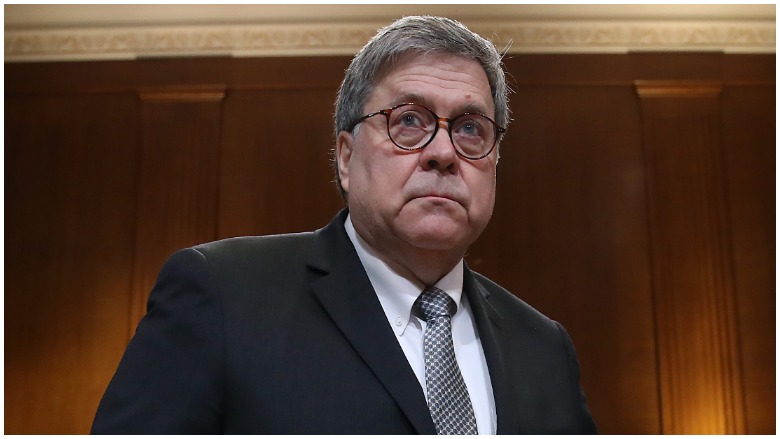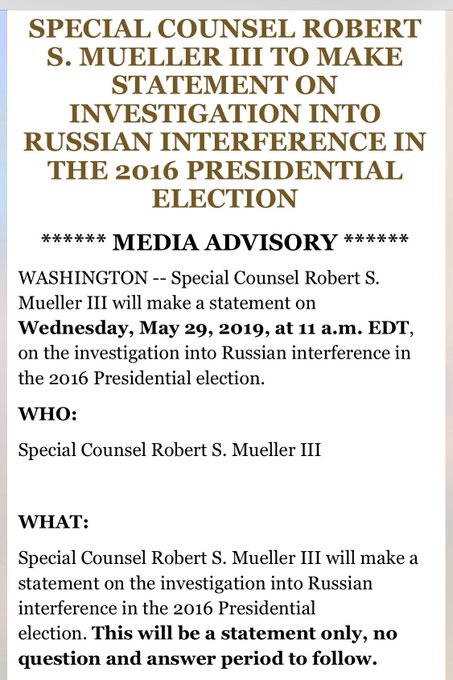
Getty Robert S. Mueller III.
Special Counsel Robert Mueller gave his first public statement on the Russia investigation on May 29, 2019, confirming that his office concluded that there was “insufficient evidence to charge a broader conspiracy” against the Trump campaign in relation to Russian efforts to interfere with the 2016 presidential election.
President Trump responded with a statement on Twitter: “Nothing changes from the Mueller Report. There was insufficient evidence and therefore, in our Country, a person is innocent. The case is closed! Thank you.”
However, Mueller also addressed allegations that the president might have committed obstruction of justice, leading some critics of the president to say they could fuel impeachment talks against President Donald Trump.
If his team had confidence that the president had not committed a crime, he would have said so, Mueller said. The report did not come to that conclusion.
Mueller confirmed that his office did not make a determination as to whether the president did commit a crime. He said it was prohibited and unconstitutional to charge a president with a federal crime. “Charging the president with a crime was therefore not an option we could consider,” said Mueller. He added, “The Constitution requires a process other than the criminal justice system to formally accuse a sitting president of wrongdoing.” That refers to impeachment procedures.
“It would be unfair to potentially accuse someone of a charge when there could be no court resolution,” according to Mueller. “We would not reach a determination one way or the other about whether the president committed a crime. That is the office’s final position.”
This is the full context of what Mueller said: “Under longstanding department policy, a president can not be charged with a federal crime while he is in office. That is unconstitutional. Even if the charge is kept under seal and hidden from public view, that too is prohibited. The special counsel’s office is part of the Department of Justice and by regulation it was bound by that Department policy. Charging the president with a crime was therefore not an option we could consider.”
An investigation of a sitting president was allowed, though, he said, because it’s important to preserve evidence while documents are available and memories fresh. That’s when Mueller added: “The Constitution requires a process other than the criminal justice system to formally accuse a sitting president of wrongdoing.”
Mueller also outlined what he characterized as a concerted Russian effort to undermine the election.
The Russian efforts to interfere in the 2016 presidential election “needed to be investigated and understood,” he said. That’s also why obstruction was investigated, Mueller said, stressing the importance of cooperation with investigations.
“When a subject of an investigation obstructs an investigation or lies to investigators it strikes at the core” of efforts to get the truth, he said, without naming Trump specifically in relation to that statement.

GettyCaption here.
On interference in the 2016 presidential election, Russian intelligence officers who were part of the Russian military launched a “concerted attack” on the American political system, said Mueller.
They stole private information and released it through fake online identities and through the organization WikiLeaks. The releases were timed to “damage a presidential candidate.” At the same time, a private Russian entity engaged in a social media operation where Russian citizens “posed as Americans in order to influence an investigation.”
He said the office’s written work should speak for itself.
“Two years ago, the acting attorney general asked me to serve as special counsel and he created the special counsel’s office,” said Mueller. He was directed to investigate Russian interference in the 2016 presidential election, Mueller said.
“I have not spoken publicly… I am speaking out today because our investigation is complete….we are formally closing the special counsel’s office.” He said he would return to private life.
There was a debate already brewing over whether Mueller would testify before Congress.
Two minutes before Mueller took the podium, reporters were informed anew that Mueller would not take questions.
Robert Mueller’s comments were his first public statement on the Russian investigation since he started leading it in 2017. Mueller submitted his report in March 2019. Attorney General William Barr then released his own, controversial summary of the Mueller findings and a redacted version of Mueller’s report soon followed. The president has characterized the Mueller investigation as a politicized “witch hunt.”
The press release announcing the Mueller statement on May 29, 2019 said, “This will be a statement only, no question and answer period to follow.”
Barr’s Summary Letter Indicated that Mueller Did Not Find Collusion Between the Trump Campaign & Russia

GettyAttorney General William Barr.
You can read Barr’s letter summarizing Mueller’s report here.
Barr sent a summary letter of what he characterized as the Robert Mueller report’s “principal conclusions” to Congress, saying that Mueller did not find that the Trump campaign “conspired or coordinated with Russia” in Russia’s efforts to influence the presidential election. Meanwhile, Democrats battle for access to the full report.
Barr also wrote that, while Mueller did not come to a conclusion on obstruction of justice allegations, he and Deputy AG Rod Rosenstein had decided Trump would not be charged with a crime on that front, either.
Barr wrote: “The Special Counsel’s investigation did not find that the Trump campaign or anyone associated with it conspired or coordinated with Russia in its efforts to influence the 2016 U.S. presidential election. As the report states, ‘The investigation did not establish that members of the Trump Campaign conspired or coordinated with the Russian government in its election interference activities.’”
Barr also confirmed, “The report does not recommend any further indictments, nor did the Special Counsel obtain any sealed indictments that have yet to be made public.”
The report also deals with accusations of obstruction of justice. After making a “thorough factual investigation” into the obstruction allegation, the Special Counsel “ultimately determined not to make a traditional prosecutorial judgment,” wrote Barr.
“The Special Counsel therefore did not draw a conclusion – one way or the other – as to whether the examined conduct constituted obstruction. Instead, for each of the relevant actions investigated, the report sets out evidence on both sides of the question and leaves unresolved what the Special Counsel views as ‘difficult issues’ of law and fact concerning whether the President’s actions and intent could be viewed as obstruction.”

